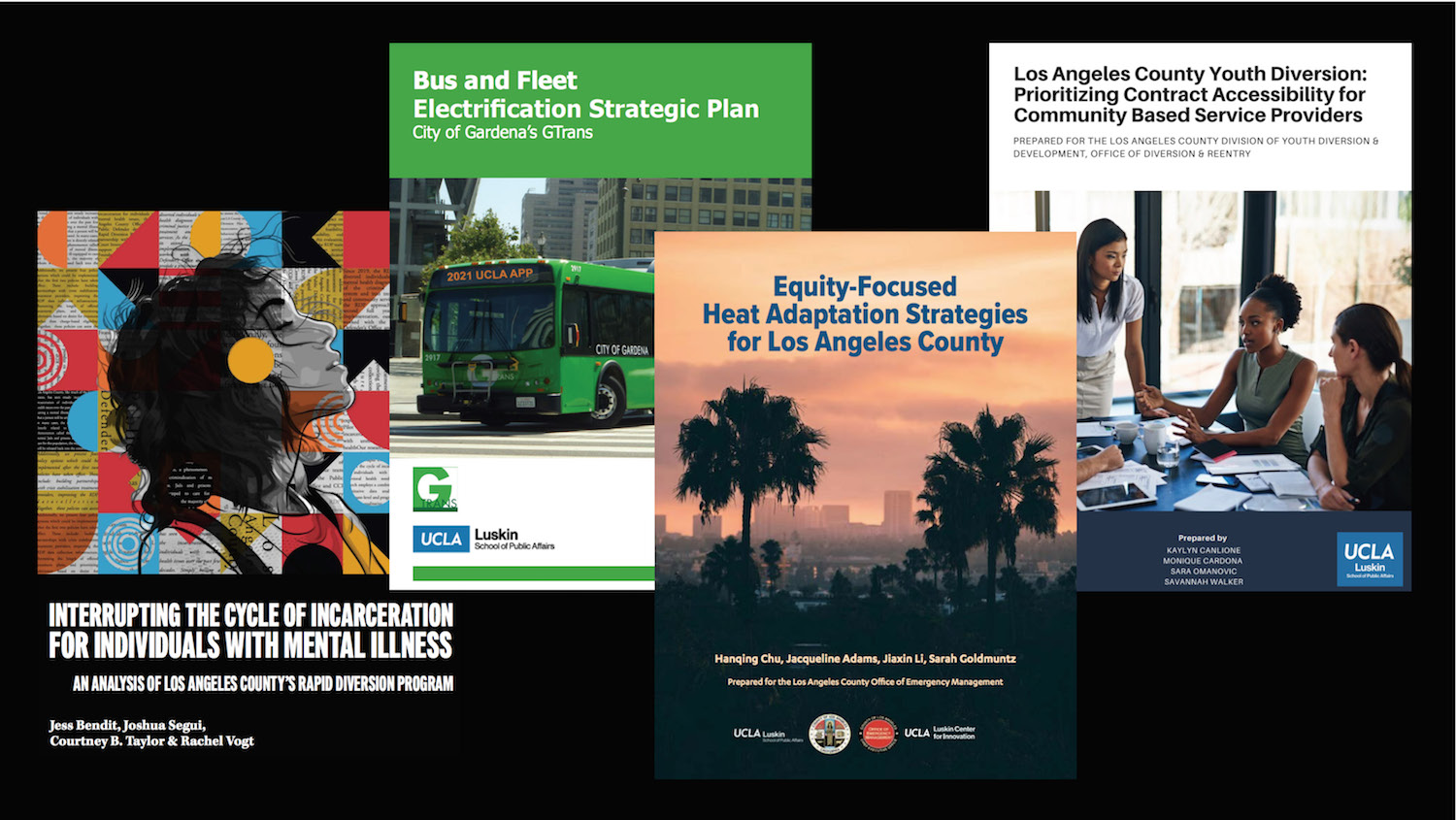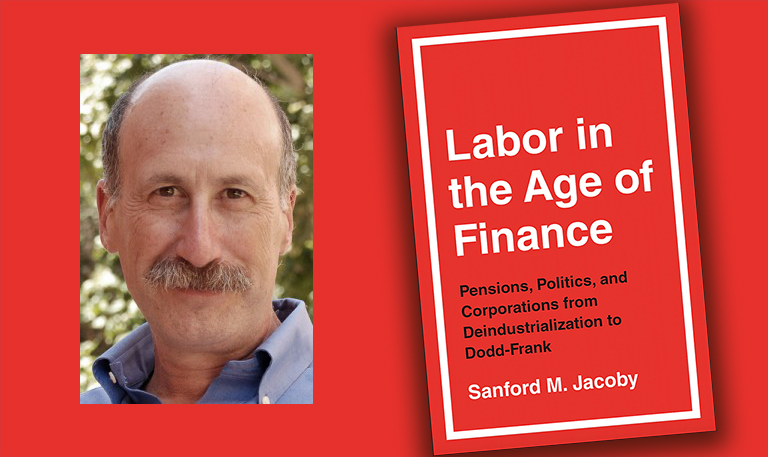Storper on the Pandemic’s Lasting Impact on Cities
Urban Planning Distinguished Professor Michael Storper co-authored a paper assessing COVID-19’s anticipated impact on the economic, political and social fabric of cities for the journal Urban Studies. As the world continues to adapt to the pandemic, “we remain in a period of extended social experimentation, with households, business, the professions and the public sector all in the game,” wrote Storper and co-authors Richard Florida of the University of Toronto and Andrés Rodríguez-Pose of the London School of Economics. Throughout history, major metropolitan areas have proved resilient to epidemics and other crises and catastrophes, they wrote. “Nonetheless, even if large cities are unlikely to lose their prominent role, they will be transformed and changed — in the short term and even well after mass immunity.” The authors predict that “social scarring” based on the continued fear of coronavirus infection will continue to influence residence choice, travel and commute patterns, and the economic viability of certain businesses and social gathering spaces. The future of downtowns hangs in the balance as remote work is normalized and online shopping grows even more common. “Cities might increasingly become cultural and civic places rather than shopping destinations or office hubs,” they wrote. Despite its horrific toll, the pandemic offers a window of opportunity where cities can reset, re-energize and call old practices into question, the authors conclude. “As cities rebuild and recover, … they can pilot efforts to confront the widening chasms between classes and neighborhoods and prepare for the many threats of climate change.”
UCLA Report Highlights Inequality in Utility Debt Burden
Scholars from the UCLA Center for Neighborhood Knowledge (CNK) and UCLA Luskin Center for Innovation (LCI) collaborated on the new report “Keeping the Lights and Heat On: COVID-19 Utility Debt,” which analyzed the burden of household utility debt for many families, especially in low-income neighborhoods. The report, co-authored by CNK Director Paul Ong and LCI Associate Director Greg Pierce, used data from Pacific Gas and Electric Company (PG&E), an investor-owned utility that provides electricity and gas service to about 40% of California residents, in order to quantify the prevalence and degree of residential past-due accounts and debt. The authors explained that utility debt levels serve as a useful proxy to track households that are facing difficulties paying their rent or mortgage, particularly during economic crises. While roughly 6% of the Northern and Central California households served by PG&E are facing financial difficulties paying for most essential services, utility debt burden is highest among Black, Latino and economically vulnerable neighborhoods, the study found. PG&E recently announced that it will extend a moratorium on utility service disconnections through September 30, although many other emergency customer protections put in place during the COVID-19 pandemic have expired. The authors of the report recommend allocating funding to debt-forgiveness programs for low-income households and severely impacted neighborhoods. They plan to replicate the study in non-PG&E service areas to better understand the impact of energy and water bill debt across regions. — Zoe Day
Policy Solutions from the Newest UCLA Luskin MPPs
To earn a master of public policy degree at UCLA Luskin, students must demonstrate their command of the analytical and communication skills needed to develop real-world policy solutions. This year, 15 teams completed the rite of passage, presenting the results of their yearlong Applied Policy Project investigations into specific problems faced by a broad array of government agencies, nonprofits and other firms working in the public interest. Clients included several city and county offices; large nonprofits including the United Way and World Vision International; a nursing home in Tianjin, China; and local advocacy groups such as Coalition for Humane Immigrant Rights Los Angeles. Students are encouraged to grapple with the challenges of policy implementation amid often conflicting social, political, economic and technical interests. During three virtual sessions in May, the teams described the policy issues they tackled, reviewed their research, presented a course of action, then fielded questions from peers and professors. They also produced full reports documenting their findings, made available to clients as well as future MPP students. This year, honors were granted to four APP projects:
- Interrupting the Cycle of Incarceration for Individuals with Mental Illness (Jess Bendit, Joshua Segui, Courtney B. Taylor, Rachel Vogt)
- Bus and Fleet Electrification Strategic Plan: City of Gardena’s GTrans (George Every, Robin Kaloustian, Will Proctor, Karishma Shamdasani, Aditya Voleti)
- Equity-Focused Heat Adaptation Strategies for Los Angeles County’s Office of Emergency Management (Hanqing Chu, Jacqueline Adams, Jiaxin Li, Sarah Goldmuntz)
- Los Angeles County Youth Diversion: Prioritizing Contract Accessibility for Community Based Service Providers (Savannah Walker, Monique Cardona, Sara Omanovic, Kaylyn Canlione)
Commencement Events Bring Class of ’21 Together
UCLA Luskin honored its Class of 2021 with two days of celebrations, including an on-campus ceremony that brought classmates together after more than a year of remaining apart. The June 10 stage-crossing event felt like a class reunion for many students who completed their coursework remotely during the COVID-19 pandemic. Although some health protocols remained in place, students from the School’s public policy, social welfare, urban planning and undergraduate programs were able to gather at UCLA’s Los Angeles Tennis Center to hear their names read aloud and take photographs with Dean Gary Segura, department chairs and fellow graduates. “Today, we have so much to celebrate,” Segura told the assembled graduates. “You have accomplished, against all odds, completing your UCLA degree during a global pandemic, and we could not be prouder of you.” Formal commencement ceremonies and speeches were posted online June 11 as the Luskin School bestowed master’s and doctoral degrees — and, for the first time, the new Bachelor of Arts in Public Affairs.
View a livestream of the on-campus event on Vimeo and additional images on Flickr.
Wachs, ITS Honored with APA Planning Awards
The American Planning Association’s Los Angeles section bestowed multiple awards on the Institute of Transportation Studies at UCLA Luskin and also honored the late Martin Wachs, professor emeritus of urban planning. Wachs, who passed away unexpectedly in April 2021, received the Planning Pioneer Award for his lifelong work as a renowned transportation scholar. The Institute of Transportation Studies won the following honors:
- The Academic Award of Excellence for the paper “School Transportation Equity for Vulnerable Student Populations Through Ridehailing: An Analysis of HopSkipDrive and Other Trips to School,” authored by doctoral student Samuel Speroni and advised by Urban Planning Professor Evelyn Blumenberg
- The Academic Award of Merit for the paper “Need for Speed: Opportunities for Peak Hour Bus Lanes Along Parking Corridors in Los Angeles,” written by Mark Hansen MURP ’20.
- The Planning Landmark Award of Excellence for the UCLA Lake Arrowhead Symposium, a series of virtual sessions centering on transportation and the pandemic.
The American Planning Association is a national organization that aims to unite leaders and professionals across the field of planning. Every year, the organization’s Los Angeles section recognizes the outstanding work, best practices and thought leaders that impact the built and natural environment in Los Angeles County.— Zoe Day
New Book by Jacoby Focuses on Labor in Age of Finance
A new book by Sanford Jacoby of UCLA Luskin analyzes the reaction of the U.S. labor movement to financialization over the past half-century. In “Labor in the Age of Finance: Pensions, Politics, and Corporations from Deindustrialization to Dodd-Frank,” Jacoby describes financialization as a transformative economic and political force that has ebbed and flowed over time. “It was, and is, associated with inequality and with robust stock markets,” said Jacoby, distinguished research professor of management, public policy and history. “Financialization waxed during industrialization, waned during the New Deal and expanded again under neoliberalism.” Jacoby noted that labor unions in the United States have shrunk since the 1970s, as has their economic clout. Jacoby’s study focused closely on the relationship between workers and shareholders who, by the 1990s, were dominated by large institutional investors such as pension plans, mutual funds and exchange-traded funds, or ETFs. He explained that the vast holdings of public corporations, and the ability to coordinate their interests, changed the balance of power: less for workers and unions, but more for investors. “The irony is that unionized workers are more likely to be covered by traditional pension plans,” he said. “It was through these plans that labor sought to bolster its organizing and political power, and, sometimes, to check the influence of corporate executives.” The power of shareholders to extract value from firms was, and remains, a key source of income and wealth inequality, Jacoby observed. But the recent political atmosphere has changed the dynamic among investors, executives and workers, he said. For more than 40 years, the winners have been executives and owners — sometimes both, sometimes only one of them. “Workers usually have lost,” Jacoby said. “If they are to gain a fair share, they will need help from unions, and unions will need help as well.”








